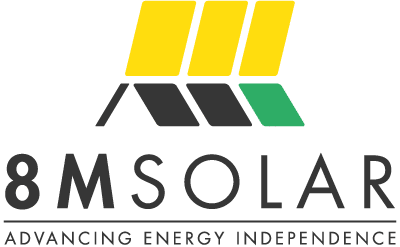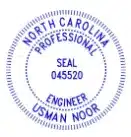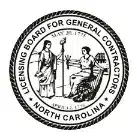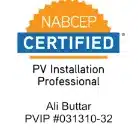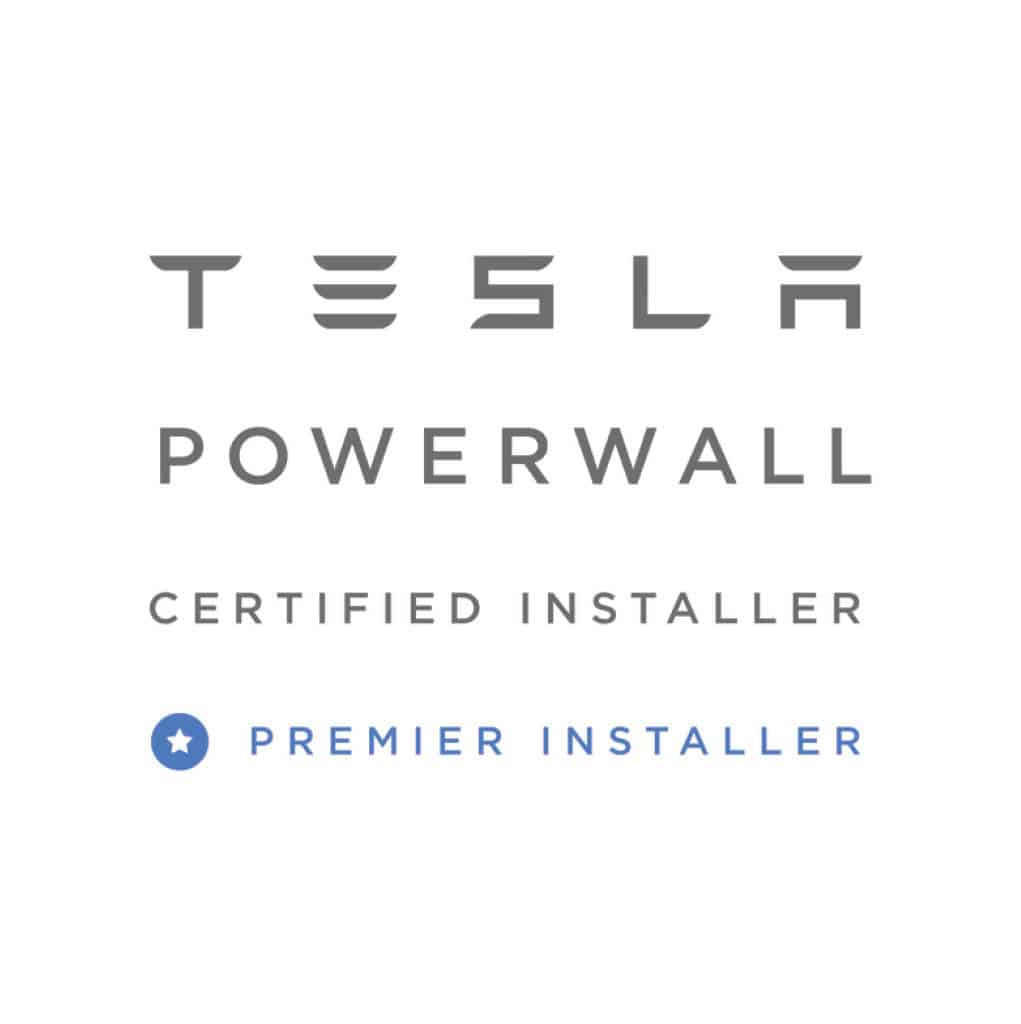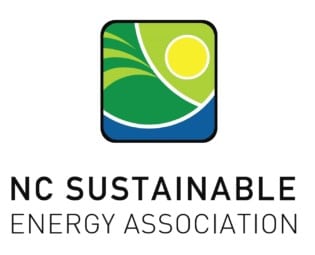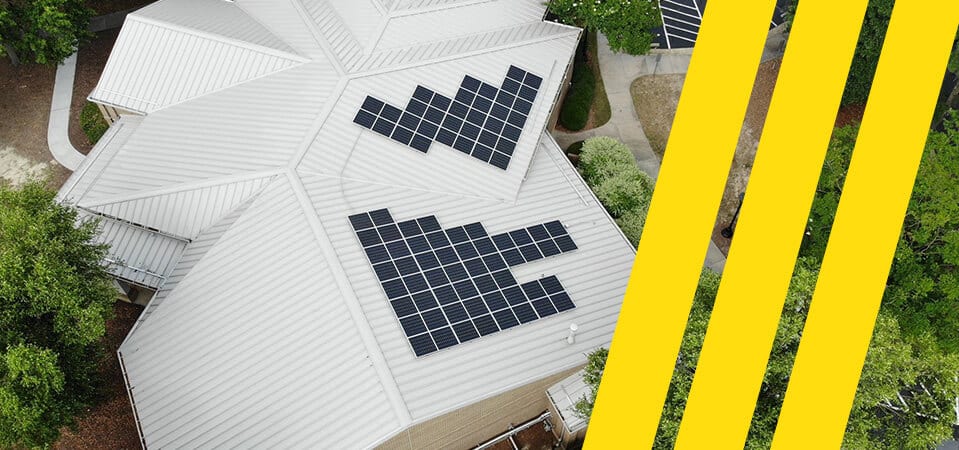
Solar panels generate direct current (DC) electricity, but the power your home or business uses requires alternating current (AC). This transformation is necessary because most household appliances and electrical systems operate on AC electricity. To make this conversion happen, solar inverters are used. These devices take the DC electricity produced by the solar panels and convert it into the usable AC electricity. There are several types of solar inverters available, each with its own set of features and benefits.
As solar technology has evolved and become more widespread, innovations in inverter technology have kept pace, offering new ways for homeowners and businesses to optimize the energy they generate from solar systems. Two of the most commonly used types of solar inverters are string inverters and microinverters. Each has its own advantages and potential drawbacks, making it important to understand their distinctions. In this guide, we will explore the key features of string inverters and microinverters to help you make an informed decision about which inverter is the best choice for your solar panel system, for your home or business.
What Are String Inverters?
A string inverter is attached to a series circuit that typically connects to a string of individual solar panels, called a solar array. A string inverter consists of a standalone box usually installed by your solar provider around your electricity meter and primary service panel. String inverters systems typically only involve one or two inverters, but the number depends on the overall size of the solar panel system.
String inverters are typically used with solar panel systems that see full sun exposure. Remembering that string inverters convert solar energy using the lowest-performing panel is essential. Ensuring all your panels have similar output is critical to get the most from your solar panel system.
Pros of String Inverters
String inverters have many distinct benefits, including:
- Reduced Costs: String inverters are among the most affordable options available for solar systems, making them a cost-effective choice for homeowners and businesses. The simplicity of the design allows for a less complex installation process, which translates into fewer labor hours. The unit itself is also typically less expensive than microinverters, reducing the overall upfront costs of setting up a solar panel system.
- Easier Troubleshooting: An advantage of string inverters is that they usually require just one unit to convert DC electricity into AC electricity. This simplifies the system and makes troubleshooting easier. If there is an issue, it’s often quicker to identify and fix, ensuring that the solar system can get back to generating energy with minimal downtime.
- Low Risk of Wiring Troubles: String inverters have fewer connections compared to other inverter types, which helps minimize the risk of wiring errors during installation. This streamlined setup reduces the chances of faulty wiring, leading to fewer repair needs. The ease of installation and lower likelihood of mistakes contribute to a more reliable solar system in the long term.
Cons of String Inverters
While string inverters have significant benefits, there are also some drawbacks to consider before deciding which inverter you prefer.
- Shorter life spans: Unlike microinverters, string inverters have shorter life spans, usually around eight to 12 years.
- Challenging system expansion: String inverters perform the best when operating near their peak capacity. If you need to expand your solar system, you will have to route these new panels to another string inverter, which adds additional costs and complexity.
- Reduced efficiency in partial shade: String inverters require a wired series of solar panels. If one of your panels has reduced output, all your solar panels will be affected similarly. Therefore, if any of your panels are shaded throughout the day, you may experience reduced efficiency overall.
- Challenges with system monitoring: If you use a string inverter, you may be unable to monitor individual panels because no components are equipped for each panel. While you can look at the total energy production of your solar panels, you will not be able to determine any individual panel performance problems.
What Are Microinverters?
Microinverters work in a parallel circuit, where they maximize the electricity production passed on the lowest-performing panel. Microinverters are smaller than string inverters, typically around the size of an internet router, and are equipped to the back of each panel. Normally, you will have just as many microinverters as solar panels.
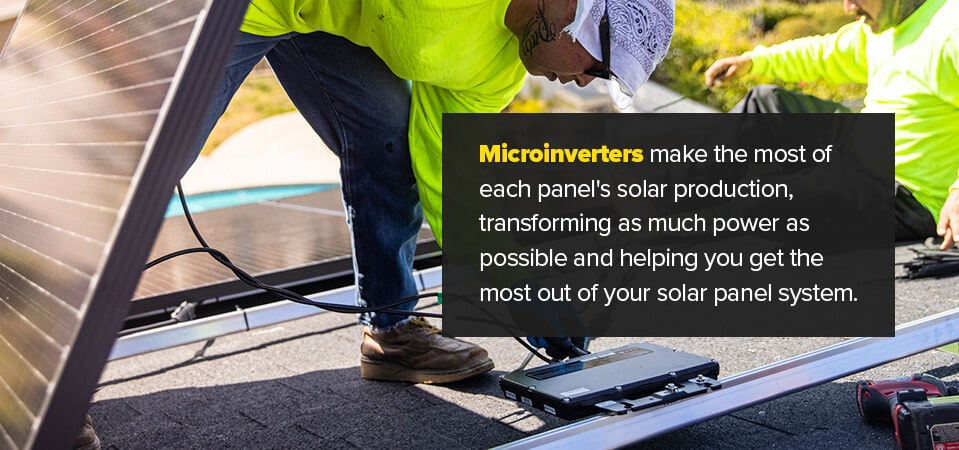
Microinverters make the most of each panel’s solar production, transforming as much power as possible and helping you get the most out of your solar panel system.
Pros of Microinverters
Microinverters have many benefits, including:
- Longer life spans: Microinverters have a longer life span than string inverters, typically around 25 years.
- Simple expansion: If you decide to expand your solar system, microinverters make it easier, as you can easily add new panels without worrying about purchasing or installing new inverters. You can also install solar panels one at a time if you are not sure how much you want to expand.
- Individual panel monitoring: Because microinverters are equipped with individual panels, you can monitor panels individually, which is significantly different from string inverters, where you can only monitor the entire system.
- Increased electricity: Microinverters allow you to yield more electricity from your solar system. Microinverters allow you to convert electricity based on individual panels, improving your overall energy generation.
- Sustainability: If your solar panels are set up in various orientations, microinverters are the best choice. Solar panels angled in different directions or covered by shade throughout the day will produce different amounts of electricity. Microinverters allow you to harvest as much energy as possible.
- Quick shutdown capabilities: If you need to shut down your solar system for any reason, microinverters allow you to turn it off quickly.
Cons of Microinverters
Microinverters have many benefits, and they are ideal for solar systems that face different orientations or are partially shaded. However, there are some drawbacks to consider before making a final decision.
- Cost: Microinverters are more expensive than string inverters, which can be a drawback for some homeowners or business owners. However, microinverters can help you maximize the power of your solar system if your panels are not oriented to receive full sunlight.
- Maintenance requirements: Microinverters can be challenging to perform maintenance on, especially compared to string inverters. If one of your microinverters malfunctions or fails, it can be difficult to determine which one is experiencing a problem. Replacing microinverters is also more difficult. Microinverter maintenance requires your solar installer to get on your roof and unbolt solar modules to replace the microinverters.
- Hardware requirements: Microinverters are fixed to every solar panel, significantly increasing the amount of hardware in your solar system. Microinverters can also attract lightning, which can be a significant challenge if you have wooden roofing materials and live in a storm-prone location.
Which Inverter Is Best for Your Solar System?
Choosing between string vs. microinverters will depend on the constraints of your project. If you can install your solar panels so they have consistent, full sun, string inverters may be the best choice. However, if parts of your solar system will be shaded throughout the day, you are better off choosing microinverters.
You will also want to consider if you want to expand your solar panel system, as microinverters are easier to work with when adding solar panels. Your budget will likely also come into play, so you will need to weigh the benefits and disadvantages to determine what system you can afford and which would help you generate the most energy savings.
Your solar installer can also help you find the best solar inverter for your home or business. Your North Carolina solar installer will have the best recommendations based on your solar panel orientation, budget and individual needs.
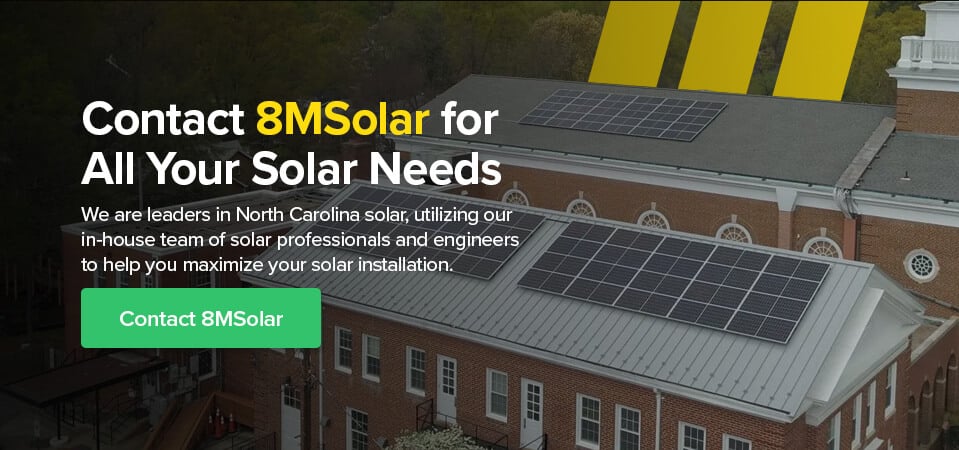
Contact 8MSolar for All Your Solar Needs
If you are unsure which solar inverter to pick, 8MSolar can help. We are leaders in North Carolina solar, utilizing our in-house team of solar professionals and engineers to help you maximize your solar installation. We have thousands of residential and commercial projects under our belt and have the knowledge and expertise to help you find premium solar solutions.
We also offer a 25- to 30-year warranty on our panels and a Lifetime Workmanship & Roof Penetrations warranty to give you peace of mind about your new North Carolina solar installation. Contact us today to learn more about how we can help you find the best solar inverter and our various services.
